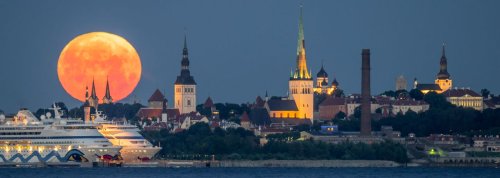Nourishing hope for the future
Situated between Scandinavia, the Baltic states, Poland, Germany and Russia, the Baltic Sea is a potential crossroads for the peoples of northern Europe. Since the beginning of the war in Ukraine, concerns have raised in a special way there. Coming together from different countries to pray, reflect and interact will help to express the commitment of young European towards rebuilding the continent as a common home with future of peace.
Hospitality: sharing a trust that builds you up
When you ask for hospitality, you say to those who welcome you: “I place myself under your protection and care, I trust you” and the hosts are saying: “We are not afraid of you, we are here for you. We want you to feel at home!”. Church congregations of all denominations and families will welcome participants. Estonia has received over 65 000 refugees from Ukraine since the beginning of the war for a total population of 1,4 million people, the highest ratio of Ukrainian refugees per inhabitants in an EU country.
A singing nation
The Singing Revolution is the name given to the step-by-step non-violent process that led to the re-establishment of Estonian independence in 1991. Singing was always a major unifying force for Estonians while they endured fifty years of Soviet rule. Estonia joined EU in 2004. Its territory covers an area of 45,228 square kilometres. It shares a 294 km long border with Russia. 26% of Estonian people are of Slavonic heritage, majority of them being Russians.
From tiger leap to digital society
In the 1990’, Estonia’s leaders decided to use advanced technology to simplify its citizens’ lives. All interaction between administrations and citizens have been digitalised. Programming is taught at a very young age. Estonia’s IT sector accounts for 4% of the entire workforce and seven percent of its GDP. This context will help us reflect on how can we use AI, IT and other technologies, grounded in sound anthropology and ethics which build up persons and communities.
Witnessing to Christ today in a non-religious society
Estonia was one of the last corners of Europe to be Christianised in the 12th century. Since Estonia joined the Reformation in the 16th century today the local culture is rooted in Lutheran and since 19th century also Orthodox traditions.
Nowadays Estonia has 80% of youth declaring that they are not affiliated with any religion. 70% of Estonian young adults declare that they never pray. Taking part in the Tallinn meeting will be an opportunity to seek the Risen Christ and bear witness to him. As the women at the empty tomb were invited to look for Jesus who “is ahead of you in Galilee”, are we not invited today to leave behind our comfort zones and seek those who live the spirit of forgiveness, peace, justice on the outskirts of Church institutions? In Tallinn, we will meet and listen to people of hope who commit themselves to serve others, to build solidarity, to make other people’s life beautiful…
Experiencing the unity of all the baptised
We will experience the unity of all the baptised in various Christian traditions. Representing a minority of the population, the different Churches are eager to speak with one voice and work together to make themselves heard. The Estonian Council of Churches brings together the ten larger denominations and invites the Taizé community to prepare the meeting in Tallinn. During the meeting, at midday we will share the prayer of different traditions in city centre churches.
Taizé and Estonia
Relationships between the Taizé community and Estonian Christians date back to the 1970’s when Anna-Maija Raittila-Nieminen, a Finnish poet, paid visits to Estonian Christians and kept them informed of what was happening in Taizé. In those years, young Russians in contact with Taizé could come to take part in summer camps organised by the Lutheran Theological Institute in Tallinn. Young Estonian people started to regularly visit Taizé and take part to European meetings beginning in 1989. In May 1990, 250 young Estonians took part in a North European Meeting which Taizé was invited to organise in Linköping, Sweden.

Picture: Raigo Tõnisalu
 TAIZÉ
TAIZÉ